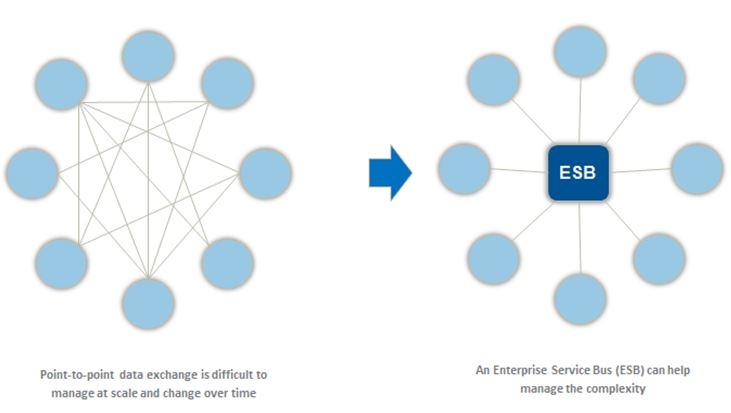What problem do we hope to solve?
- Many integration problems are currently solved by point-to-point interfaces. Sometimes that means using a data store like ODS as a place to “drop off” data for other systems to “pick up”. Sometimes it means that 2 systems have an interface directly between one another.
- An Enterprise Service Bus (ESB) and API Manager provide an avenue for integration solutions to evolve into more advanced data integration. This evolution will not happen over night, but over years. This doesn’t mean that we will never do batch interfaces – there is still a place where that type of solution makes sense. It does mean that we want to show our customers when it makes sense to try a different approach because batch files and operational data store (ODS) dumps are not always ideal.

Point-to-point data exchange is difficult to manage at scale and changes over time. An Enterprise Service Bus (ESB) can help manage the complexity.
How do we solve it?
- We are actively looking for integration needs that are common amongst UCSF departments. For example, many systems need people data, or department data, or financial data.
- We hope to build one interface to each source system to make that kind of data reusable and easy to get for additional systems. It won’t eliminate future integration work, but it will minimize the amount of work that subsequent consumers of the same kind of data have to do. It will also save time for the source system as they won’t need to create a new integration for each consumer.
- Also, each data provider will be able to dictate their own data governance policies. Our technology enforces each consumer application to follow these data governance policies. This also allows data providers to control which systems are consuming their data.
Mule Enterprise Service Bus Platform
- Common integration patterns
- Publish/subscribe – keep data in sync between systems. Event driven
- Batch – scheduled data feeds
- API – access data when you need it. On demand. Sometimes used to store data, but not always a requirement
Mule API Management
- Common integration solutions
- Application Programming Interface (API) – real-time data access when you need it. On demand. Sometimes used to store data, but not always a requirement
- Our team can help you expose your existing APIs
- We can help design and develop new APIs
- We also host and manage your APIs, providing security, rate limiting, and monitoring.
PaaS – Platform as a Service
- The Mule ESB and API Manager are available to UCSF developers to utilize for their own integration needs